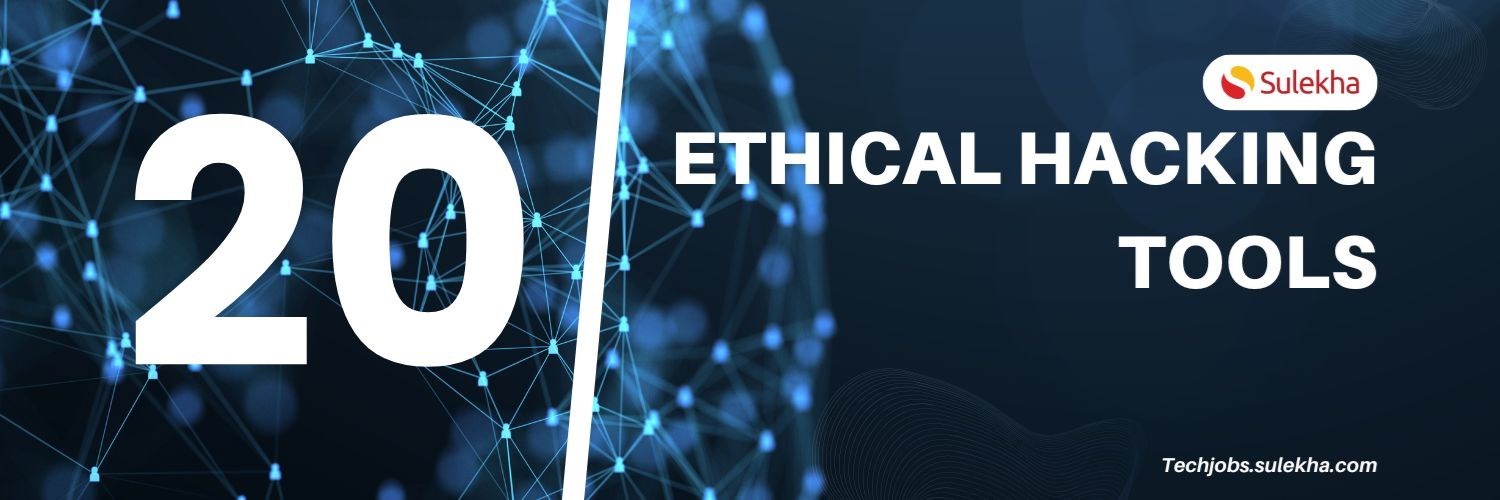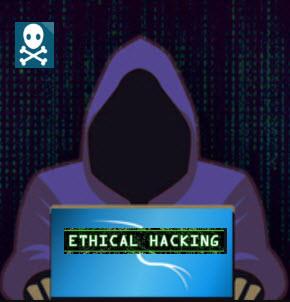Top 15 Ethical Hacking Tools to Use in 2024

Ethical Hacking Tools and Software are essential resources that assist security professionals in identifying vulnerabilities within systems and networks before malicious actors can exploit them. Some of the most famous ethical hacking tools on the market are essential for securing systems and networks. These include penetration testing tools, wireless network tools, and other specialized tools for detecting system insecurities. Cybersecurity professionals, such as penetration testers, vulnerability assessors, and security consultants, rely on these tools to identify and fix vulnerabilities.
Large companies, government agencies, and small businesses also use these tools to protect sensitive data. Crucial examples of these tools include network scanners, vulnerability scanners, password crackers, packet sniffers, penetration testing frameworks, and Kali Linux. These Ethical hacking tools and techniques streamline tasks such as information gathering and vulnerability scanning, thereby enhancing efficiency in security assessments. Through hands-on learning experiences, these tools help security professionals practice ethical hacking techniques and develop their cybersecurity skills effectively. Our Cyber Security Skill Test is the perfect way to evaluate your knowledge! This test allows you to gauge your understanding of core cybersecurity concepts through a series of objective questions.
Before we delve into the best Ethical Hacking Tools, we will begin the blog with core essential topics, including what Ethical Hacking is, what Ethical Hacking Tools and Software are, and the importance of Hacking Tools.
What is Ethical hacking?
Ethical hacking is a crucial component of cybersecurity, serving as a proactive approach to identify and address vulnerabilities within systems and networks before malicious actors can exploit them. Ethical hackers, also known as white hat hackers, utilize various tools and techniques to simulate attacks and assess the security posture of organizations.
Ethical hackers play a vital role in strengthening cybersecurity defenses by mimicking malicious hackers' actions with clients' authorization. Their primary goal is to find weaknesses in systems and applications, enabling organizations to patch vulnerabilities and enhance their overall security posture. Ethical hacking tools and methodologies contribute to creating practical testing tools, aid in vulnerability identification, improve incident response capabilities and enhance secure development practices within organizations.
Why Hacking Tools and Software are crucial?
Hacking tools and software are crucial for cybersecurity professionals to test and fortify digital defenses. They provide insights into vulnerabilities, allowing organizations to patch weaknesses and prevent cyber-attacks. Additionally, they aid in ethical hacking practices, helping to identify and address potential threats before malicious actors exploit them.
Top 20 Ethical Hacking Tools to Use in 2025
1. Aircrack-ng
Aircrack-ng is a suite of tools for assessing Wi-Fi network security. It focuses on monitoring, attacking, and cracking WEP/WPA/WPA2 encryption keys.
Key Features:
Packet capture and injection
WEP and WPA-PSK cracking
Supports multiple wireless cards
Command-line based for automation
Use Cases:
Wi-Fi penetration testing
Network security audits
Recovering lost Wi-Fi passwords (ethical use)
2. John the Ripper
John the Ripper is a fast and flexible password-cracking tool that supports multiple encryption algorithms. It is widely used for auditing password strength.
Key Features:
Brute-force and dictionary attacks
Supports UNIX, Windows, and database passwords
Customizable cracking modes
Open-source with community enhancements
Use Cases:
Password recovery (ethical hacking)
Security audits
Testing password policies
3. Invicti (formerly Netsparker)
Invicti is a web application security scanner that automates vulnerability detection, including SQL injection, XSS, and misconfigurations.
Key Features:
DAST (Dynamic Application Security Testing)
Proof-based scanning for accurate results
Integration with CI/CD pipelines
Compliance reporting (OWASP, PCI DSS)
Use Cases:
Web application security testing
Vulnerability management
DevSecOps integration
4. Cain & Abel
Cain & Abel is a Windows-based password recovery and network security tool that can crack passwords, sniff network traffic, and analyze encrypted protocols.
Key Features:
ARP poisoning for MITM attacks
Password cracking (LM/NTLM hashes, VoIP, etc.)
Network sniffing
Supports rainbow table attacks
Use Cases:
Password auditing
Network security testing
Ethical hacking demonstrations
5. Fortify WebInspect
Fortify WebInspect by Micro Focus is an automated dynamic application security testing (DAST) tool for identifying vulnerabilities in web applications.
Key Features:
Advanced crawling and scanning
Real-time vulnerability assessment
Compliance reporting (OWASP Top 10, CWE)
Integration with DevSecOps workflows
Use Cases:
Enterprise web security testing
Compliance audits
Secure SDLC implementation
6. Zenmap
Zenmap is a free and open-source GUI for Nmap, available on various operating systems like Linux, Windows, Mac OS X, and BSD. It complements Nmap by providing an interactive and graphical interface for easier use, displaying results visually, comparing scans, enabling repeatability, and simplifying network topology mapping. Zenmap enhances Nmap's usability, especially for beginners or those with limited experience in Linux shell environments.
About Zenmap
When Umit was modified and integrated into Nmap in 2007, it was renamed Zenmap.
The primary author of Umit was Adriano Monteiro Marques.
Pricing: Free and open-source
7. Angry IP Scanner
Angry IP Scanner is a free and open-source tool for discovering devices on your network. It scans ranges of IP addresses, revealing which devices are active and gathering information like their operating system. This helps network administrators and users map their networks quickly.
About Angry IP Scanner
The program is written and maintained by Anton Keks
The last version to run under Java 8 is 3.7.6.
Pricing: Free
8. Advanced IP Scanner
Advanced IP Scanner is a free, fast, and powerful network scanner tool developed by Famatech. It allows users to scan local networks and remotely access computers to gather information about connected devices, including their IP addresses, MAC addresses, and network services. With its user-friendly interface and comprehensive features, Advanced IP Scanner is widely used by network administrators and IT professionals for network management, troubleshooting, and security auditing tasks.
About Advanced IP Scanner
Developed by Famatech.
Advanced IP Scanner is integrated with Radmin.
Pricing: Free to use.
9. Fping
Fping is a fast and efficient tool for network administrators on Linux systems. It's similar to the familiar ping command but built for pinging multiple targets simultaneously. Fping supports both IPv4 and IPv6 addressing, allowing users to test connectivity to hosts on networks using either IP protocol version. Here's a quick breakdown:
About Fping
Roland Schemers published the first version of it in 1992
Announcing version 3
Faster pinging
Multiple target support
Lightweight and efficient
Pricing: Free to use.
10. Unicornscan
Unicornscan is a sophisticated and powerful stateless port scanner designed for information gathering and correlation in cybersecurity. It operates as a user-land distributed TCP/IP stack, providing researchers with a superior interface to introduce stimuli and measure responses from TCP/IP-enabled devices or networks. Some key features of Unicornscan include asynchronous stateless TCP scanning with various TCP flags, asynchronous TCP banner grabbing, and active/passive remote OS, application, and component identification through response analysis.
About Unicornscan
It supports TCP, UDP, ICMP, and SCTP
version: 0.4.7
Pricing: Free to use.
11. Netcat
Netcat, also known as NC, is a versatile utility tool that uses TCP and UDP connections to read and write data across network connections. It serves various purposes in cybersecurity, including connecting to specific ports on target hosts, transferring files across networks, creating backdoors for remote access, and executing programs or scripts between clients and servers. Netcat can be used for tasks like chatting between users, saving output to files, and facilitating file transfers across different devices.
About Netcat
It uses both TCP and UDP for communication.
Integrated with Nmap
It has statically compiled Windows binary version of Ncat 5.59BETA1
Pricing: Free to use.
12. NetScanTools
NetScanTools is a comprehensive set of network tools. It includes over 50 powerful tools in an easy-to-use interface, catering to Network Administrators, Engineers, Technicians, and Training Instructors. NetScanTools offers an installed version, NetScanTools Pro, and a portable USB version for professionals on the go. NetScanTools Basic Edition, a freeware version, also provides essential network tools like DNS Tools, Pto manage and troubleshoot network connectivity effectivelying, Traceroute, and Whois. NetScanTools is a valuable resource for network professionals who want to effectively manage and troubleshoot network connectivity.
About NetScanTools
NetScanTools are 32 bit programs that run equally well on 32 or 64 bit Windows 11 or 10.
Pricing: Paid
13. Nessus
Nessus is a proprietary vulnerability scanner developed by Tenable, Inc. to identify security vulnerabilities in devices, applications, operating systems, and network resources. Created as a free remote security scanner in 1998, Nessus transitioned to a proprietary license with the release of Nessus 3 in 2005. It conducts over 1200 computer checks to detect vulnerabilities that malicious hackers could exploit. Nessus is known for its extensive plugin database, Predictive Prioritization feature for categorizing vulnerabilities by severity, and the ability to generate customizable reports in various formats.
Pricing: Paid
14. OpenVAS
OpenVAS, developed and driven forward by Greenbone since 2006, is a comprehensive vulnerability scanner that provides both unauthenticated and authenticated testing capabilities. It supports various high-level and low-level internet and industrial protocols, performance tuning for large-scale scans, and a powerful internal programming language for implementing different vulnerability tests. OpenVAS obtains vulnerability tests from a feed with a long history and daily updates, making it a valuable tool for cybersecurity professionals to assess and enhance the security of systems and networks effectively.
Pricing: Free
15. Acunetix
Acunetix streamlines web application security tasks, such as vulnerability research, confirmation, and remediation guidance, allowing users to automate these processes and save time. The tool is known for its ability to provide a 360-degree view of an organization's security, making it a valuable asset for enhancing cybersecurity measures and ensuring compliance with industry standards.
About Acunetix
In 2005, Acunetix was created
2016, cloud security was introduced
2018, part of Invicti security
Pricing: Paid
16. Qualys Cloud Platform
Qualys Cloud Platform is an all-in-one solution for managing your organization's security posture. It offers a comprehensive suite of tools to continuously assess vulnerabilities, ensure compliance, and respond to threats across your IT infrastructure. Here's a quick rundown:
1. Cloud-based
2. Vulnerability management:
3. Compliance management
4. Threat detection and response
Pricing: Paid
17. Nexpose
Nexpose is an on-premises vulnerability management software developed by Rapid7, designed to monitor exposures in real time and adapt to new threats with fresh data. It provides real-time coverage of an entire network, offers meaningful risk scores to prioritize vulnerabilities, and equips IT teams with the necessary information to address issues promptly and efficiently. Nexpose's capabilities include monitoring exposures in real-time, adapting to new threats, and providing actionable intelligence to discover, locate, and prioritize vulnerabilities effectively. Additionally, it offers advanced features, such as Remediation Workflow and the Insight Agent, for enhanced vulnerability management.
Pricing: Paid
18. SAINT Security Suite
SAINT Security Suite is a comprehensive cybersecurity solution beyond mere vulnerability assessment to provide a fully integrated shield against security threats. It offers robust vulnerability assessment, granular reporting with over 150 options, proactive incident response mechanisms, and seamless third-party integrations. SAINT Security Suite is highly rated by customers, with a 4.6/5 rating on G2, affirming its reliability and efficiency in bolstering cybersecurity postures. This suite includes features like social engineering testing, penetration testing, asset management, advanced analytics, incident response, and powerful reporting capabilities to address various cybersecurity needs effectively.
Pricing: Paid
19. Nikto
Nikto is an open-source web server scanner that performs comprehensive tests against web servers for multiple items, including over 6700 potentially dangerous files or programs on web servers, version-specific problems on servers, and other security-related issues. It is designed to identify vulnerabilities, such as outdated server software, misconfigurations, and known security risks on web servers. Penetration testers and security professionals often use Nikto to assess the security posture of web servers and identify potential weaknesses that attackers could exploit. Here's a breakdown of Nikto's key features:
1. Vulnerability scanning
2. Extensive checks
3. Fast and efficient
4. Multiple output formats
Pricing: Free
20. Nmap
Nmap, short for "Network Mapper," is a free and open-source network scanning tool used to discover hosts and services on a computer network. It is widely utilized by network administrators and security professionals to assess network security, identify vulnerabilities, and conduct security audits.
About Nmap
Nmap 7.90 has been released with Npcap 1.00
Nmap 6 is an updated release.
Pricing: free and open-sourcepricing: free and open source
What are the best ethical hacking tools for beginners?
Wireshark
Wireshark is a widely used network protocol analyser that captures and inspects network traffic in real-time. It helps in troubleshooting, analysis, and forensic investigations.
Key Features:
Deep packet inspection
Supports hundreds of protocols
Live capture and offline analysis
Cross-platform (Windows, Linux, macOS)
Use Cases:
Network troubleshooting
Malware traffic analysis
Security forensics
Metasploit
Metasploit is a powerful penetration testing framework that enables security professionals to test vulnerabilities, develop exploits, and execute targeted attacks. It provides a vast collection of exploits, payloads, and auxiliary modules for security assessments.
Key Features:
Open-source and commercial (Pro) versions available
Supports exploit development and vulnerability validation
Integration with other security tools like Nmap and Nessus
Meterpreter payload for advanced post-exploitation
Use Cases:
Penetration testing
Vulnerability assessment
Security awareness training
Here are the reasons why Ethical hackers rely on hacking tools:
Identification of Vulnerabilities
Penetration Testing
Security Assessment
Mitigation Strategies
Enhanced Defense
In conclusion, the top 15 ethical hacking tools for 2025 offer a diverse range of capabilities to security professionals and ethical hackers. From network scanning and vulnerability assessment to penetration testing and traffic analysis, these tools play a crucial role in identifying and mitigating security risks. By leveraging these tools effectively, cybersecurity experts can strengthen defenses, protect digital assets, and stay ahead of evolving cyber threats in the dynamic landscape of cybersecurity.
Take the next step towards your professional goals in Ethical Hacking
Don't hesitate to talk with our course advisor right now
Receive a call
Contact NowMake a call
+1-732-338-7323Related blogs on Ethical Hacking to learn more

What are the Advantages of Ethical Hacking?
Ethical hacking is a proliferating career path among various rapidly evolving technologies in the IT and non-IT industries.

A glance into the world of Ethical hacking
A hacker is an individual or a group of people who steals the private information of a person or an organization and gains advantages from it from their digital device or network using various hacking tools. Majorly there are three types of hackers:

How to Boost Cyber Security As An Ethical Hacker
Cyber security is protecting the Information systems from damage or theft of the software, hardware and to the sensitive information on them. It involves the controlling of the access to the hardware and protecting

What Are Most Sought-After Certifications For Ethical Hackers?
One of the high demand jobs in the IT field is that of an ethical hacker, who intentionally penetrates into the systems and networks to detect and fix vulnerabilities.The term hacking of computers, carries with it a negative impact. It just brings to

The Importance of Penetration Testing and What it takes to be a Penetration Tester
“What is penetration testing?” is a commonly asked question. Penetration testing is a complex process that involves testing applications for security vulnerabilities. Easier said than done, penetration testing has become a major part of ethical hacki

A Comprehensive Guide To Become A Successful White Hat Hacker
Hacking is considered to be an offense but it is ethical, when under a contract between an organization and a hacker. Breaking into the computer system was a practice of the geeks but now surprisingly, it is a career option. In the past few years, th

Ethical Hacking – Offering Several Advantages
The term ‘hacking of computers’; carries with it a negative impact. It just brings to the mind images of techies stealing customer identities, sensitive information and disabling vital computer networks but hacking can also be used to bring about pos
Latest blogs on technology to explore

Drug Safety & Pharmacovigilance: Your 2026 Career Passport to a Booming Healthcare Industry!
Why This Course Is the Hottest Ticket for Science Grads & Healthcare Pros (No Lab Coat Required!)" The Exploding Demand for Drug Safety Experts "Did you know? The global pharmacovigilance market is set to hit $12.5B by 2026 (Grand View Research, 202

Launch Your Tech Career: Why Mastering AWS Foundation is Your Golden Ticket in 2026
There’s one skill that can open all those doors — Amazon Web Services (AWS) Foundation

Data Science in 2026: The Hottest Skill of the Decade (And How Sulekha IT Services Helps You Master It!)
Data Science: The Career that’s everywhere—and Nowhere Near Slowing Down "From Netflix recommendations to self-driving cars, data science is the secret sauce behind the tech you use every day. And here’s the kicker: The U.S. alone will have 11.5 mill

Salesforce Admin in 2026: The Career Goldmine You Didn’t Know You Needed (And How to Break In!)
The Salesforce Boom: Why Admins Are in Crazy Demand "Did you know? Salesforce is the 1 CRM platform worldwide, used by 150,000+ companies—including giants like Amazon, Coca-Cola, and Spotify (Salesforce, 2025). And here’s the kicker: Every single one

Python Power: Why 2026 Belongs to Coders Who Think in Python
If the past decade was about learning to code, the next one is about coding smarter. And in 2026, the smartest move for any IT enthusiast is learning Python — the language that powers AI models, automates the web, and drives data decisions across ind

The Tableau Revolution of 2025
"In a world drowning in data, companies aren’t just looking for analysts—they’re hunting for storytellers who can turn numbers into decisions. Enter Tableau, the #1 data visualization tool used by 86% of Fortune 500 companies (Tableau, 2024). Whether

From Student to AI Pro: What Does Prompt Engineering Entail and How Do You Start?
Explore the growing field of prompt engineering, a vital skill for AI enthusiasts. Learn how to craft optimized prompts for tools like ChatGPT and Gemini, and discover the career opportunities and skills needed to succeed in this fast-evolving indust

How Security Classification Guides Strengthen Data Protection in Modern Cybersecurity
A Security Classification Guide (SCG) defines data protection standards, ensuring sensitive information is handled securely across all levels. By outlining confidentiality, access controls, and declassification procedures, SCGs strengthen cybersecuri

Artificial Intelligence – A Growing Field of Study for Modern Learners
Artificial Intelligence is becoming a top study choice due to high job demand and future scope. This blog explains key subjects, career opportunities, and a simple AI study roadmap to help beginners start learning and build a strong career in the AI

Java in 2026: Why This ‘Old’ Language Is Still Your Golden Ticket to a Tech Career (And Where to Learn It!
Think Java is old news? Think again! 90% of Fortune 500 companies (yes, including Google, Amazon, and Netflix) run on Java (Oracle, 2025). From Android apps to banking systems, Java is the backbone of tech—and Sulekha IT Services is your fast track t